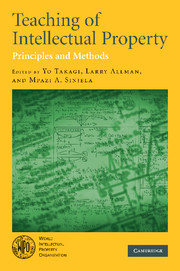Book contents
- Frontmatter
- Contents
- Notes on contributors
- List of abbreviations
- Table of figures
- Foreword
- 1 Recent trends and challenges in teaching intellectual property
- 2 Teaching patents
- 3 Teaching copyright and related rights
- 4 Teaching trademark law
- 5 Teaching industrial design law
- 6 Teaching intellectual property, unfair competition and anti-trust law
- 7 Teaching the economics of intellectual property rights in the global economy
- 8 Teaching intellectual property in a business school
- 9 Teaching IP practical skills for practitioners and attorneys
- 10 Teaching intellectual property to non-law students
- 11 Using the new technologies in teaching intellectual property (distance learning)
- 12 Teaching current trends and future developments in intellectual property
- Index
2 - Teaching patents
Published online by Cambridge University Press: 05 June 2012
- Frontmatter
- Contents
- Notes on contributors
- List of abbreviations
- Table of figures
- Foreword
- 1 Recent trends and challenges in teaching intellectual property
- 2 Teaching patents
- 3 Teaching copyright and related rights
- 4 Teaching trademark law
- 5 Teaching industrial design law
- 6 Teaching intellectual property, unfair competition and anti-trust law
- 7 Teaching the economics of intellectual property rights in the global economy
- 8 Teaching intellectual property in a business school
- 9 Teaching IP practical skills for practitioners and attorneys
- 10 Teaching intellectual property to non-law students
- 11 Using the new technologies in teaching intellectual property (distance learning)
- 12 Teaching current trends and future developments in intellectual property
- Index
Summary
Introduction and overview
Among intellectual property rights, patents, as exclusive rights of exploitation with blocking effects, occupy a prominent place and are characterized by many peculiarities: they reveal the closest link to most advanced technological and scientific developments; they play a crucial role in the innovation process as an incentive to invent, innovate and invest in high risk research and development (R&D); and they are an important factor in international economic relations. Whereas the importance of patents in all these respects is not disputed, much controversy exists whether their respective economic impact is beneficial and if so, for whom.
As far as the results of the most advanced scientific and technical developments, such as DNA-sequences, embryonic stem cells, gene therapy, genetically modified plants or animals, or computer software and business methods, are concerned, the question arises whether they are eligible for patent protection, and if eligible, under which conditions. Moreover, does patent law take into account aspects of ethics, protection of human, animal or plant life, or health and the environment? Does, and if so how does, the law resolve the tension between the patent as an exclusive right with blocking effects, often misleadingly called “monopoly,” on the one hand, and competition, a fundamental pillar of the market economy, on the other? In other words, how are patents treated by anti-trust law?
Finally, how can one protect patents internationally? Which instruments of international public law serve patent protection and, what is their economic impact?
- Type
- Chapter
- Information
- Teaching of Intellectual PropertyPrinciples and Methods, pp. 13 - 32Publisher: Cambridge University PressPrint publication year: 2008
- 2
- Cited by



